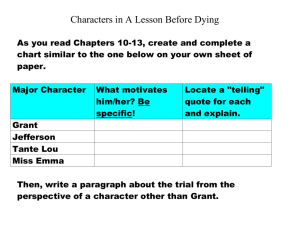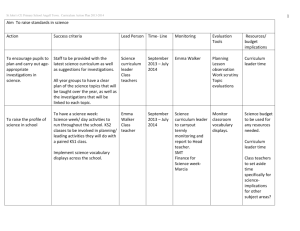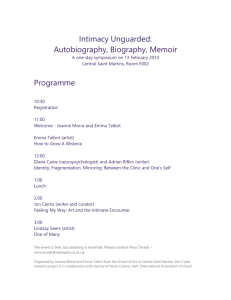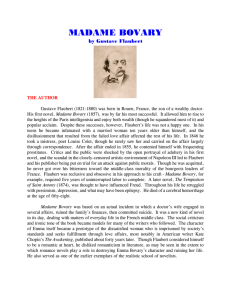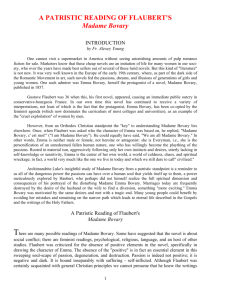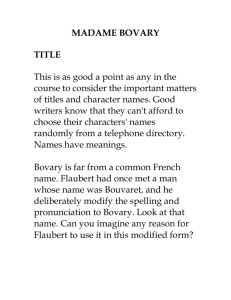Realism and Romanticism in Madame Bovary
advertisement
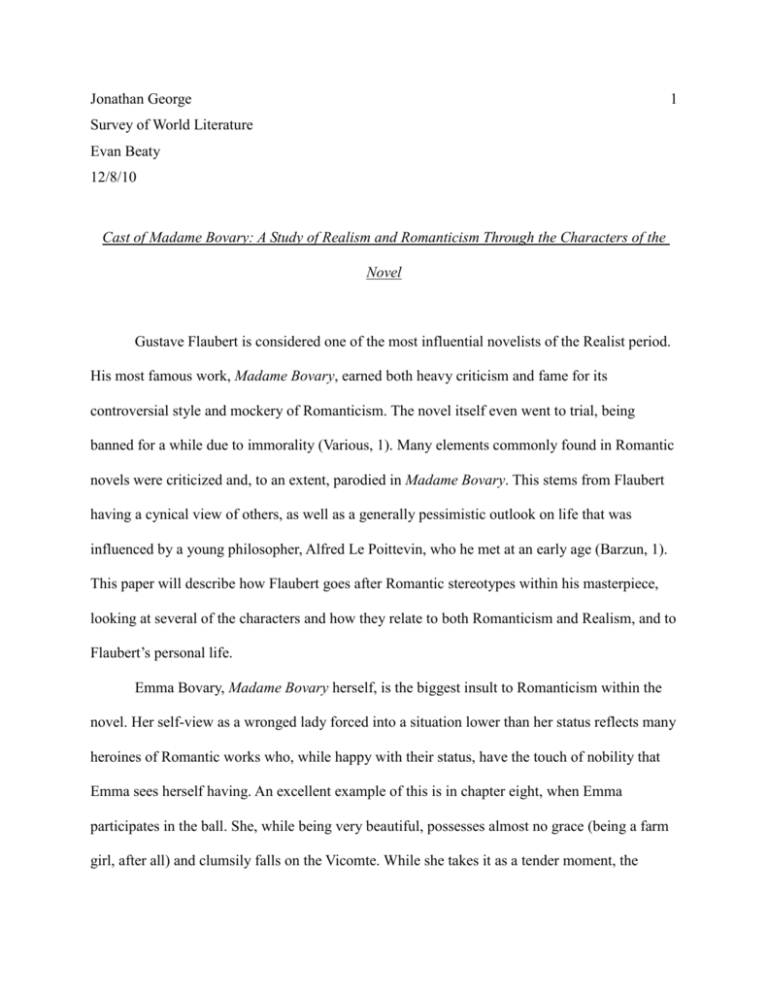
Jonathan George 1 Survey of World Literature Evan Beaty 12/8/10 Cast of Madame Bovary: A Study of Realism and Romanticism Through the Characters of the Novel Gustave Flaubert is considered one of the most influential novelists of the Realist period. His most famous work, Madame Bovary, earned both heavy criticism and fame for its controversial style and mockery of Romanticism. The novel itself even went to trial, being banned for a while due to immorality (Various, 1). Many elements commonly found in Romantic novels were criticized and, to an extent, parodied in Madame Bovary. This stems from Flaubert having a cynical view of others, as well as a generally pessimistic outlook on life that was influenced by a young philosopher, Alfred Le Poittevin, who he met at an early age (Barzun, 1). This paper will describe how Flaubert goes after Romantic stereotypes within his masterpiece, looking at several of the characters and how they relate to both Romanticism and Realism, and to Flaubert’s personal life. Emma Bovary, Madame Bovary herself, is the biggest insult to Romanticism within the novel. Her self-view as a wronged lady forced into a situation lower than her status reflects many heroines of Romantic works who, while happy with their status, have the touch of nobility that Emma sees herself having. An excellent example of this is in chapter eight, when Emma participates in the ball. She, while being very beautiful, possesses almost no grace (being a farm girl, after all) and clumsily falls on the Vicomte. While she takes it as a tender moment, the 2 Vicomte is horribly embarrassed at her lack of skill and clumsiness, and sets her back in her seat to find a more suitable partner. While Emma daydreams about that moment, the Vicomte is busy dancing the same dance with a new lady, one who knows what to do and can keep up with him, improving his image. Other examples are littered throughout the novel, including Emma’s overdone “tragic” suicide with arsenic and the subsequent overdone “tragic” deathbed sequence. One of Emma’s lovers, Rodolphe Boulanger, unlike Emma, actually possesses a romantic spark, one that is presented in a style that fits the realism of Madame Bovary. Rodolphe is a wealthy landowner who visited Charles (Emma’s husband) to have one of his workers bled. Upon seeing Emma, he was immediately intrigued and began a set of plans to seduce her, which succeeded. While Emma thought of Rodolphe as the strapping aristocrat who would save her from the humdrum life she lived with Charles, Rodolphe, however, only saw her as a pursuit for sexual means. Rodolphe was revealed to have no delusions about his life. He was wealthy and fairly attractive, and constantly went through the company of women. So many women had proclaimed their everlasting love for him, some honestly and others for profit, that he became desensitized to the words. Emma’s proclamations proved no more successful and he had no desire to whisk her away. This would give Rodolphe the appearance of a one dimensional character, simply a womanizer. However, towards the end of the novel, when Emma is desperately in debt and is exhausting every means to acquire the funds, tracks him down. At this point in the novel, Rodolphe has already broken ties with Emma and has moved on, but upon her arrival and confrontation we see him have the beginnings of a change of heart. As Emma speaks about forgiving Rodolphe and her desire to be with him again, oddly false, considering her actual plans with him before they broke up, he seems enticed at the idea and genuinely willing to try 3 having a strong healthy relationship. In this way, Rodolphe fits both into the Romantic character persona (rich, charismatic, poetic in his speech) and that of a realistic character (his past experiences influence how he acts now, but he is capable of change). Another character with the spark of the Romantic is Leon Dupuis, who first appears in the second chapter of part two. Leon is, in many ways like Emma. He seeks the romantic life, full of adventure and high society. The aggravation with his current lifestyle brought on by his adolescence speaks to Emma and they hit it off quite quickly. They quickly foster a powerful relationship that could easily become more passionate, but Emma pushes him away. In her mind, she was being a good wife, and was possibly pursuing the Romantic ideal of the love that could never be (like Romeo and Juliet). Despite his advances, Emma pushes Leon away, and finally he leaves for Paris to pursue his career. Leon still pines for Emma, however, and, later in the novel, he has Emma visit him. An affair forms from these visits, one that Leon’s superiors at work do not approve of, as Flaubert made clear throughout its course. As this new subplot continues, their passion, which was feverishly strong at the beginning of the affair begins to wane and they both find faults and problems with the relationship. As Emma struggles to work out her debts from constantly buying luxuries that she can’t possibly afford, even asking Leon to pawn off some silverware her father gave her, he began to question her actions. In the end, however, what finally separated them was Leon growing up. He was quite good at his job and was moving up in the world. Eventually Emma’s constant sobs and cries bored him, he grew tired of the constant sadness and suffering, and even their sex became boring for him. When Emma sought him out for money directly, even trying to push him to steal from 4 his office, he fashioned a lie to get away from her, and left her forever. Leon’s Romantic way of thinking originally came from boredom with Yonville, where he lived. He grew out of it, however, and would go on to pursue realistic goals, a nice wife, a good job, etc. This is how Leon was different from Emma, who never got her mind out of the Romantic way of thinking. To her, the happiest life one could live was in that fashion. Monsieur Homais has similar delusions about his life. Homais owned and ran the pharmacy in Yonville, making his first appearance at the beginning of part two. Homais, in a word, is a blowhard, loving the sound of his own voice as he goes on about various subjects he knows little or nothing about. Before Charles’ arrival, he acts as the town doctor since Yonville does not have one. He doesn’t really know what he is doing, however, and usually ends up just prescribing drugs or other items that can be bought at his store, which often puts him in trouble with the law. He loves the idea of recognition and glory in work, and ends up pushing Charles to do an experimental surgery to fix the clubfoot of one of the town’s stable workers. The surgery seemed to go well enough, but Charles, not being a doctor, made a small mistake that ended with the boy losing his leg. Unlike the other characters in this analysis, Homais is portrayed very realistically. His pompous attitude and self-serving ideals create an almost sinister appearance, but his actual actions and speech reveal him as an obnoxious but ultimately harmless person. Other than the previously mentioned surgery, he doesn’t have an incredibly large influence on the action (the arsenic Emma uses to kill herself was found in Homais’ pharmacy, but he didn’t give it to her) although he shows up very often, often arguing or lecturing on subjects he knows very little of. One of the recurring scenes of the novel includes Homais arguing with the priest over issues of 5 science and God. An argument about the matter even comes up shortly after Emma’s death, while the two are in the main room of the Bovary house. Homais does end up building credibility however, and. by the end of the novel, his influence allowed him to force any doctor that tried to set up in Yonville out of business. The very last sentence of the book mentions Homais being awarded the cross of the Legion of Honor, a prestigious award. By the end of the novel, both Emma and Charles are dead, their lives destroyed, while two other characters, specifically, experienced much happier endings. Leon got married to a decent woman and began a life of maturity, while Homais, through his scheming and tactics, became very successful in Yonville. Both of these characters brought to light ways that Romanticism can end. In Leon’s case, Romantic thoughts of youth and aggravation can be wiped away as real life becomes more pertinent, and, with maturity, responsibility became his way of thinking. Homais’ constant delusions of grandeur paid off for him, in the end, as he found ways to exploit what knowledge he had, and what he thought of himself became what other people thought. Charles Bovary is a very interesting character in that he represents to Emma a Romantic story’s villain while he’s actually just a very down to earth person. Another aspect of Charles is his connection to Flaubert. Being born to a family of doctors gave Flaubert access to many medical books, which gave him knowledge of medicine few in his field had. From this, the experiences of Charles, and even Homais, have a much more believable feel. Being born in Rouen, the town that Leon left for, Flaubert also had an idea of what life was like in the area. Charles was a simple man, he was a hard worker, but wasn’t very intelligent. Another fact rang truer with him than with any other character: he loved Emma. His love for her, though often 6 shunned by Emma for not being the Romantic overly passionate love she wanted, burned brighter and more emotionally than any other character’s. His simple-mindedness is what put him in the role of the “villain” that Emma wanted to escape from. His simple life and lack of luxury infuriated her and pushed her to pursue people like Rodolphe, who was rich and, at the very least, feigned passion. Until Emma’s death, Charles had no real delusions about his life. He helped people as he could and didn’t try to overstep his bounds as a medical officer for personal gain, although Homais and Emma both pressured him into the clubfoot operation. When Emma died his truly passionate side came forth and he tried to live in a way that she would have liked him to. Sadly, this meant buying luxury items he couldn’t afford and spending money he didn’t have on frivolous things. Eventually, he lost everything and died penniless. Such was the life of a simple and ordinary man who had nothing exceptional about him at all. Flaubert’s descriptions of Charles always painted him in a bland light, one that could easily blend into the background, but this is the point. Charles was nothing special, but he was a good man with a solid job. Realistically, that was what many women were looking for at the time, except for Emma, who sought only the greatest and most luxurious, carefree lifestyles based around her Romantic novels. In a way the characters listed here represent a spectrum of Romanticism to realism. Emma sat at the far end of the Romantic side, her delusions never leaving her, even as she lay dying she could think of nothing but the melancholic and tragic death she wanted, unlike Charles’ first wife who died very suddenly in the middle of the day. Leon would be next in line, his Romantic and passionate views mirroring those of Emma. Leon, however, would grow out of 7 them and move on to more realistic pursuits. In the middle would be Homais, possessing selfdelusions that would rival Emma’s, but having a fairly realistic view of life in general. Rodolphe would land closer to Charles’ end of the spectrum, while proclaiming false passion, he had a very realistic idea of what his life actually consisted of and what kind of person he was. Finally, Charles would be at the most realistic end of the spectrum, with absolutely no delusions about his life, himself, or what he wanted in the future. All of these characters portray different views of Romanticism and realism, and combine them in ways that result in a very interesting literary work. Flaubert’s attacks on Romanticism spew out through Leon and Emma, their passionate ideals ringing hollow and empty while the realistic views of Homais and Rodolphe are more successful. Flaubert’s own opinion of Romanticism, based on this novel, could not have been a positive one. His ability to capture an accurate view of middle class life and present it both realistically and in an entertaining way provides an excellent look into his own views. Although he valued objectivity more than anything else in his works, his viewpoints come through very clearly. 8 Sited Sources Barzun, Jacques, and Rene Dumesnil. "Gustave Flaubert (French Author) -- Britannica Online Encyclopedia." Encyclopedia - Britannica Online Encyclopedia. Encyclopedia Britannica, 2010. Web. 08 Nov. 2010. <http://www.britannica.com/EBchecked/topic/209756/Gustave-Flaubert>. Madame Bovary. The Norton Anthology of World Literature. 1800 to 1900. Trans. Francis Steegmuller. By Gustave Flaubert. New York: Norton, 2002. 1088-301. Print. Various. The Public vs. M. Gustave Flaubert. Comp. Juliet Sutherland and Rosanna Yuen. Project Gutenberg - Free Ebooks Online Download for IPad, Kindle, Nook, Android, IPhone, IPod Touch, Sony Reader. 10 Jan. 2004. Web. 04 Dec. 2010. <http://www.gutenberg.org/cache/epub/10666/pg10666.html>.

